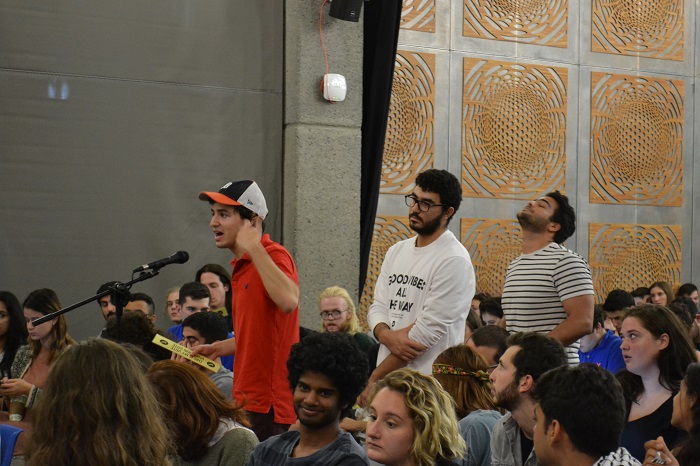At a meeting on Jan. 14, the Students’ Society of McGill University (SSMU) Board of Directors (BoD) voted to ratify the Judicial Board (J-Board) decision released on Dec. 31 on the case of Glustein vs. Koparkar. With five in favour, three abstentions and three absences, the BoD vote affirmed the J-Board’s ruling that it was unconstitutional to vote on BoD members’ ratifications individually at the Fall General Assembly (GA), thus nullifying the split vote to ratify seven out of 10 nominations to the BoD. The decision also absolved Maya Koparkar, SSMU Vice-President (VP) Internal Affairs and BoD member, and Jad El Tal, former SSMU speaker, of blame for the incident.
The case, which went to trial on Nov. 30, addressed events at the Oct. 23 GA, where Koparkar motioned to split the ratification of BoD nominations from one bloc vote for all 12 nominees into individual votes for each nominee. After deliberation, El Tal allowed a version of Koparkar’s motion to be voted on, and it passed. Shortly after the GA, Jonathan Glustein, a former member of the 2017 BoD who was not up for reappointment, filed a petition with the J-Board claiming that this motion was unconstitutional and therefore that a new bloc ratification vote should be taken. The J-Board agreed with him.
“The Judicial Board believes that the Motion Regarding the Nomination of Directors for the Board of Directors should be voted on again at another General Assembly or as a Referendum question—this time, as a whole,” its Dec. 31 decision reads.
The BoD members nominated at the Fall GA were scheduled to begin sitting on Nov. 15, when the contracts of the 2017 Directors terminated. However, on Oct. 28, the J-Board released an interim order suspending the results of the GA until a final decision could be made. SSMU President and BoD Chair Muna Tojiboeva announced at a Nov. 5 BoD meeting that, after consulting with SSMU’s legal team, that the past term’s members would remain on the BoD until the case was completed. Five of the members, including three executives, would be serving on both boards.

Per the SSMU Internal Regulations, all decisions made by the J-Board must be approved by the BoD in order to become final. Glustein, Koparkar, and Alexander Scheffel abstained from voting on the final J-Board decision, and Noah Lew was not present for the vote.
Tojiboeva announced at a Nov. 5 BoD meeting that the results of the GA were suspended by the J-Board, and that the past term’s members would remain on the BoD until the case was completed. Now that a ruling has been issued, the new bloc vote will be held via online referendum from Jan. 15 to 18.
In an interview in November, Koparkar noted that she made the original motion at the GA because she was under the impression that the BoD agreed it would improve their democratic legitimacy.
“In September, when there was a lot of controversy over who was on the Board, one of the Board members had said that our board wasn’t democratic because it wasn’t made of fully elected representatives,” Koparkar said. “Someone else said that they were elected because they were ratified at the GA. However, it’s a bloc vote so the first director said that made this not legitimate. Then the General Manager had suggested putting each candidate on a separate ballot in the future and everyone agreed to this. At Legislative Council we [ratified the Board members] with a division of the question as well.”
Although he emphasized his support for all 12 BoD nominees, SSMU VP Student Life and Director Jemark Earle shared Koparkar’s opinion on the democratic merits of individual ballots for each nominee.
“Voting in a [bloc] forces you to either sacrifice your own personal values to let someone represent you who could be problematic or vote against people who you support just because of one or two people,” Earle said. “When the Councillors were being nominated to [the BoD] at Council, it was done individually, [which] I believe was much more democratic than had it been done as a [bloc].”









